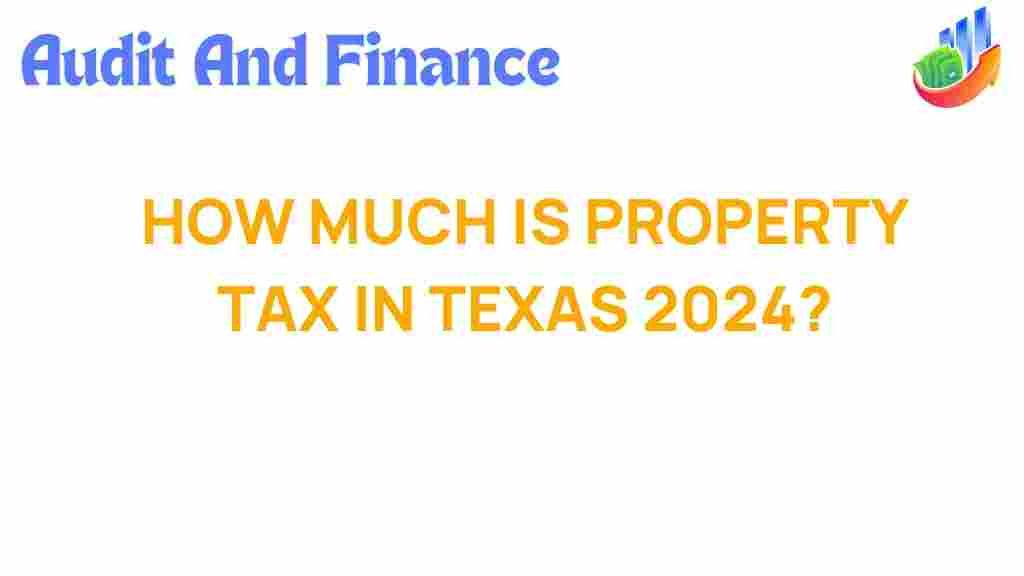Unraveling the Mystery of Property Tax in Texas for 2024
Understanding property tax in Texas for 2024 is essential for homeowners, investors, and anyone involved in the real estate market. As the state continues to grow, property tax rates and assessment values can significantly impact your finances. This comprehensive guide will take you through the intricacies of property tax, covering everything from assessment rates and tax rates to exemptions and how local governments operate within this framework.
What is Property Tax?
Property tax is a levy imposed by local governments on real estate properties. In Texas, property tax is a primary source of revenue for local municipalities, funding essential services such as education, public safety, and infrastructure. Understanding how property taxes are calculated and assessed is crucial for homeowners and real estate investors alike.
How Property Tax Works in Texas
In Texas, property tax is based on the assessed value of your property. The assessment process involves several steps:
- Property Assessment: Local appraisal districts assess property values annually. This assessment considers various factors, including property size, location, and market trends.
- Tax Rate Determination: The local government sets tax rates based on the budgetary needs for the upcoming year. These rates can vary significantly between different counties and cities.
- Calculation of Property Tax: The property tax due is calculated by multiplying the assessed value of the property by the local tax rate.
Understanding Assessment Rates
Assessment rates are crucial in determining your property tax bill. In Texas, properties are typically assessed at their market value, which can fluctuate based on market conditions. The local appraisal district is responsible for determining these values. For 2024, it’s vital to stay informed about any changes in assessment practices, as these can affect your tax obligations.
Tax Rates in Texas for 2024
Tax rates in Texas can differ widely depending on the local government and the specific services provided. For 2024, homeowners should expect potential increases in tax rates due to rising property values and local budget needs. Here are some key points to consider:
- City and County Rates: Each city and county will have its own tax rate, which can be found on local government websites.
- School District Rates: A significant portion of property tax revenue goes to public school districts, and these rates can vary.
- Municipal Utility Districts (MUDs): If your property is within a MUD, there may be additional taxes to support local utilities.
Exemptions Available for Homeowners
Texas offers several exemptions that can help reduce your property tax burden. Here are some notable exemptions for 2024:
- Homestead Exemption: This exemption reduces the appraised value of your primary residence, lowering your tax bill.
- Over 65 Exemption: Homeowners aged 65 and older can qualify for additional exemptions.
- Disabled Persons Exemption: Individuals with disabilities may also be eligible for exemptions.
- Veterans Exemption: Disabled veterans and their surviving spouses can receive significant property tax relief.
To qualify for these exemptions, homeowners need to file an application with their local appraisal district. It’s crucial to stay updated on deadlines for filing to ensure you receive the benefits.
How Local Governments Use Property Tax Revenue
Property tax revenue plays a vital role in funding local services. Here’s how your property taxes are typically allocated:
- Education: A significant portion goes to public schools, helping to pay for teachers, facilities, and educational programs.
- Public Safety: Funding for police, fire departments, and emergency services is often covered by property tax revenue.
- Infrastructure: Local governments use property taxes to maintain and improve roads, parks, and public facilities.
Steps to Navigate Property Tax in Texas
To effectively manage your property tax obligations in Texas for 2024, follow these steps:
- Stay Informed: Keep up with local property tax news and changes in legislation that may affect you.
- Review Your Assessment: Check your property’s assessed value and compare it to similar properties in your area.
- File for Exemptions: Ensure you apply for any exemptions you qualify for to reduce your tax burden.
- Attend Local Meetings: Engage with local government meetings to understand budgetary needs and how they impact tax rates.
- Consider Professional Help: If you have concerns about your property tax assessment, consider hiring a property tax consultant.
Troubleshooting Common Property Tax Issues
Property tax issues can arise for various reasons. Here are some common problems and how to address them:
- Incorrect Assessment: If you believe your property has been overvalued, gather evidence and file a protest with your local appraisal district.
- Missed Exemption Filing: If you missed the deadline for exemptions, inquire about late filing options as some exemptions may still apply.
- Unexpected Tax Increase: If your tax bill has increased significantly, review local budget proposals and attend meetings to understand the reasons.
Conclusion
Navigating property tax in Texas for 2024 may seem daunting, but with the right knowledge and proactive measures, homeowners can manage their responsibilities effectively. By understanding assessment rates, tax rates, and available exemptions, you can ensure you’re making the most of your property tax situation. Stay informed, engage with your local government, and don’t hesitate to seek help if needed.
For further information about property tax rates and exemptions, visit the Texas Comptroller website. If you’re interested in real estate investment strategies in Texas, check out our detailed guide here.
This article is in the category Taxation and created by AuditAndFinance Team
